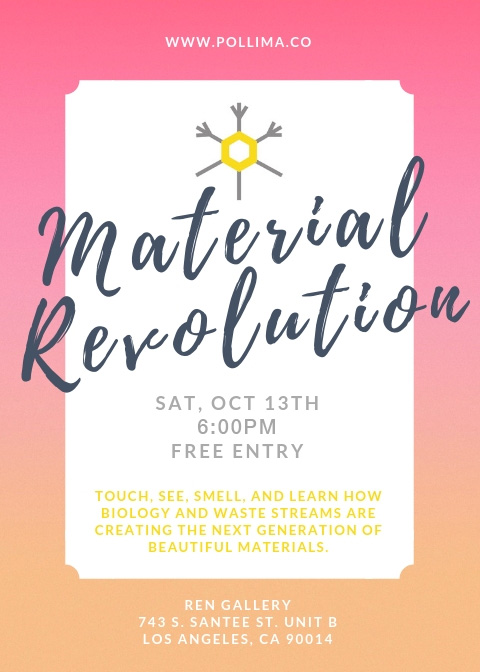In celebration of Los Angeles Fashion Week 2018, Pollima is hosting an exclusive event for forward-thinking brands and partners. This event will bring together leaders from across the fashion industry who are propelling the material revolution into a new circular economy with less waste and more sustainability. Living Colour is proud to be part of it!
Why do we need this material revolution?
For the environment. The size of the Great Pacific Garbage Patch is equivalent to Texas. Microplastics kill animals and are found in over 90% of water tested in the US. Viscose and Rayon are made from trees in our forests, often times ancient forests. Yet, Agraloop found that pineapple leaves, banana stalks, flax stalks, hemp stalks, and cane bagasse combined create more than 250M tons of fiber per year which is 2.5x the current global fiber demand. Currently, this fiber is usually either burned or left in piles to anaerobically decompose creating greenhouse gases. Not cool.
For humanity. The textile industry is responsible for 20% of industrial water pollution and cotton uses a quarter of the world’s pesticides. Not only are chemicals poisonous to our human communities, but if we eat seafood that is eating microplastics, we are consuming chemicals that block or mimic our natural hormones. Thereby, preventing our bodies from working properly and in some cases causing deadly cancer. Double not cool.
For the circular economy. Globally, 1 garbage truck full of textiles is sent to the landfill or incinerated every second. Yet, there is an economic incentive to cycle that material back into the economy. 66% of global millenials are willing to spend more money on brands that are sustainable. Levi Strauss’s, Chip Bergh said in The State of Fashion 2018, “In China… the value they place on how brands do business, what brands stand for is off-the-charts compared to any prior generation.” Very cool.
Come touch, smell, and learn how biology and waste are creating the next generation of materials.
About Pollima
Pollima is a visionary consulting brand connecting designers, investors, and material manufacturers to upcycling and recycling solutions. Pollima partners with industry leaders utilizing textile waste, agricultural waste, bacteria, and other materials from the waste stream to push the fashion and interiors industries into a circular future.
According to the McKinsey & Company’s State of Fashion 2018 Report, less than 1% of material not used to produce clothing is recycled into new clothing. Aside from the $500 billion/year economic value loss, there are countless negative environmental and societal impacts. Together, we are all partners in the material revolution to raise the industry standards and re-imagine our waste streams.
Kombucha Leather, Bacteria Dye, Mycelium Materials And More
Material Revolution
Join us on Saturday, October 13th at Ren Gallery in the LA Fashion District for an evening full of revolutionary lifestyle and fashion materials.
Showcasing:
- Agricultural-waste alternative leathers, textiles, and buttons
- Kombucha leather and rolling papers
- Mycelium materials
- Bacteria dyed textiles
- Recycled cannabis paper
- Upcycled textiles
- and more!
Programme:
- 6:00 PM
Social experiments begin and exhibit opens - 6:30 PM
Panel: Brands and Designers : Where are we going? - 8:00 PM
Panel : The Bio Materialists : How are we doing? - 9:30 PM
Lounge discussion: Regenerative Business Future: 5Gyres, Beyond The Label, CocoTaps, I:CO and Fashion Revolution
When
Saturday October 13 2018
6:00pm – 10:00pm
Where
Ren Gallery
743 S. Santee St.
Los Angeles
Free tickets
See the full programme with all panellists & get your free tickets here.

